将来完成时练习题及答案
- 格式:doc
- 大小:37.00 KB
- 文档页数:3
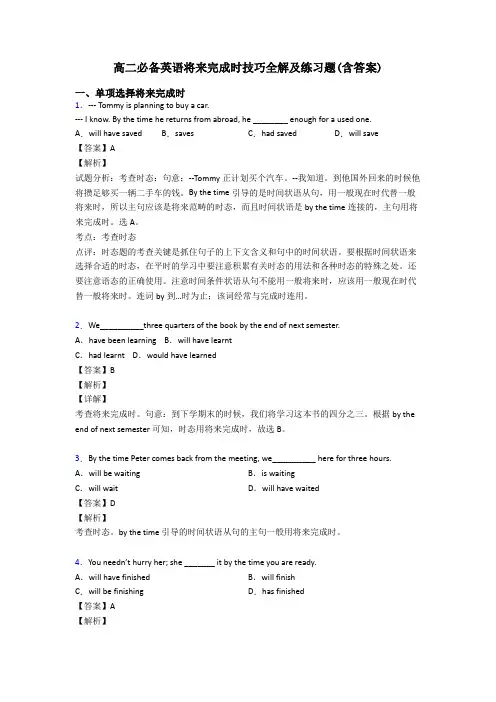
高二必备英语将来完成时技巧全解及练习题(含答案)一、单项选择将来完成时1.--- Tommy is planning to buy a car.--- I know. By the time he returns from abroad, he ________ enough for a used one.A.will have saved B.saves C.had saved D.will save【答案】A【解析】试题分析:考查时态:句意:--Tommy正计划买个汽车。
--我知道。
到他国外回来的时候他将攒足够买一辆二手车的钱。
By the time引导的是时间状语从句,用一般现在时代替一般将来时,所以主句应该是将来范畴的时态,而且时间状语是by the time连接的,主句用将来完成时。
选A。
考点:考查时态点评:时态题的考查关键是抓住句子的上下文含义和句中的时间状语。
要根据时间状语来选择合适的时态,在平时的学习中要注意积累有关时态的用法和各种时态的特殊之处。
还要注意语态的正确使用。
注意时间条件状语从句不能用一般将来时,应该用一般现在时代替一般将来时。
连词by到…时为止;该词经常与完成时连用。
2.We__________three quarters of the book by the end of next semester.A.have been learning B.will have learntC.had learnt D.would have learned【答案】B【解析】【详解】考查将来完成时。
句意:到下学期末的时候,我们将学习这本书的四分之三。
根据by the end of next semester可知,时态用将来完成时,故选B。
3.By the time Peter comes back from the meeting, we__________ here for three hours. A.will be waiting B.is waitingC.will wait D.will have waited【答案】D【解析】考查时态。
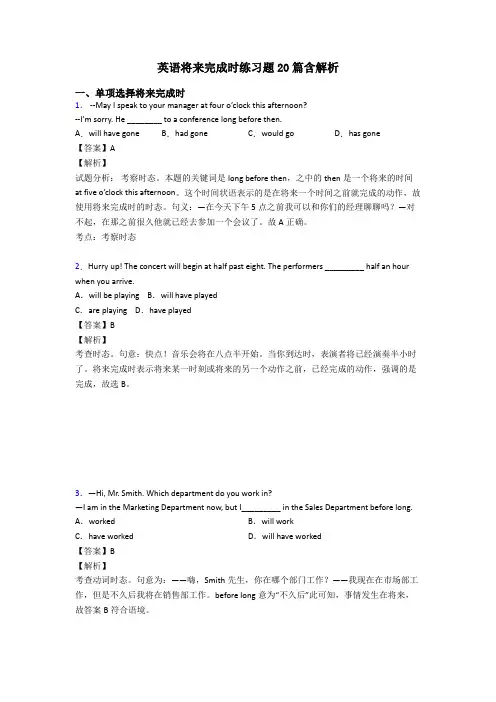
英语将来完成时练习题20篇含解析一、单项选择将来完成时1. --May I speak to your manager at four o’clock this afternoon?--I’m sorry. He ________ to a conference long before then.A.will have gone B.had gone C.would go D.has gone【答案】A【解析】试题分析:考察时态。
本题的关键词是long before then,之中的then是一个将来的时间at five o’clock this afternoon。
这个时间状语表示的是在将来一个时间之前就完成的动作,故使用将来完成时的时态。
句义:—在今天下午5点之前我可以和你们的经理聊聊吗?—对不起,在那之前很久他就已经去参加一个会议了。
故A正确。
考点:考察时态2.Hurry up! The concert will begin at half past eight. The performers _________ half an hour when you arrive.A.will be playing B.will have playedC.are playing D.have played【答案】B【解析】考查时态。
句意:快点!音乐会将在八点半开始。
当你到达时,表演者将已经演奏半小时了。
将来完成时表示将来某一时刻或将来的另一个动作之前,已经完成的动作,强调的是完成,故选B。
3.—Hi, Mr. Smith. Which department do you work in?—I am in the Marketing Department now, but I_________ in the Sales Department before long. A.worked B.will workC.have worked D.will have worked【答案】B【解析】考查动词时态。
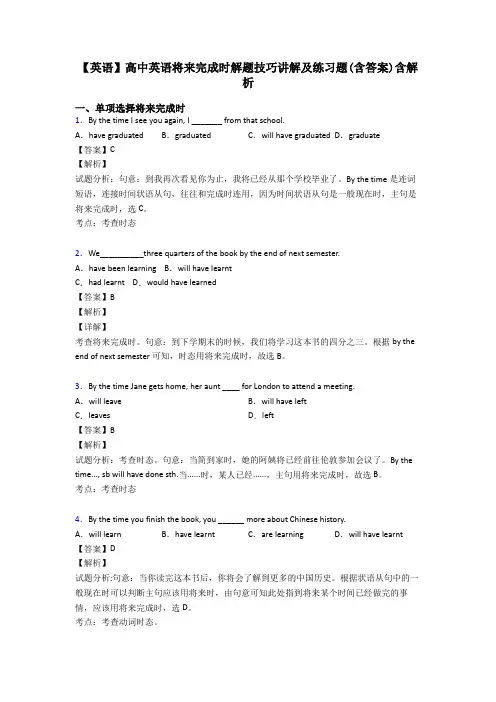
【英语】高中英语将来完成时解题技巧讲解及练习题(含答案)含解析一、单项选择将来完成时1.By the time I see you again, I _______ from that school.A.have graduated B.graduated C.will have graduated D.graduate【答案】C【解析】试题分析:句意:到我再次看见你为止,我将已经从那个学校毕业了。
By the time是连词短语,连接时间状语从句,往往和完成时连用,因为时间状语从句是一般现在时,主句是将来完成时,选C。
考点:考查时态2.We__________three quarters of the book by the end of next semester.A.have been learning B.will have learntC.had learnt D.would have learned【答案】B【解析】【详解】考查将来完成时。
句意:到下学期末的时候,我们将学习这本书的四分之三。
根据by the end of next semester可知,时态用将来完成时,故选B。
3.By the time Jane gets home, her aunt ____ for London to attend a meeting.A.will leave B.will have leftC.leaves D.left【答案】B【解析】试题分析:考查时态。
句意:当简到家时,她的阿姨将已经前往伦敦参加会议了。
By the time..., sb will have done sth.当......时,某人已经......,主句用将来完成时,故选B。
考点:考查时态4.By the time you finish the book, you ______ more about Chinese history.A.will learn B.have learnt C.are learning D.will have learnt 【答案】D【解析】试题分析:句意:当你读完这本书后,你将会了解到更多的中国历史。
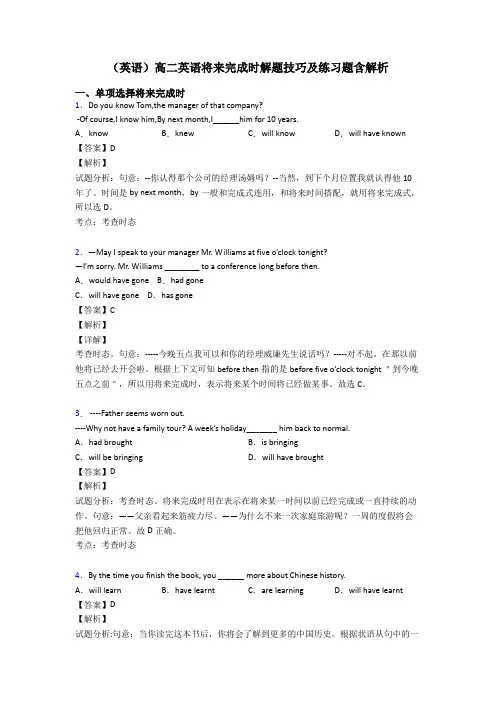
(英语)高二英语将来完成时解题技巧及练习题含解析一、单项选择将来完成时1.Do you know Tom,the manager of that company?-Of course,I know him,By next month,I______him for 10 years.A.know B.knew C.will know D.will have known 【答案】D【解析】试题分析:句意:--你认得那个公司的经理汤姆吗?--当然,到下个月位置我就认得他10年了。
时间是by next month,by一般和完成式连用,和将来时间搭配,就用将来完成式,所以选D。
考点:考查时态2.—May I speak to your manager Mr. Williams at five o’clock tonight?—I’m sorry. Mr. Williams ________ to a conference long before then.A.would have gone B.had goneC.will have gone D.has gone【答案】C【解析】【详解】考查时态。
句意:-----今晚五点我可以和你的经理威廉先生说话吗?-----对不起。
在那以前他将已经去开会啦。
根据上下文可知before then指的是before five o’clock tonight "到今晚五点之前",所以用将来完成时,表示将来某个时间将已经做某事。
故选C。
3. ----Father seems worn out.----Why not have a family tour? A week’s holiday_______ him back to norm al.A.had brought B.is bringingC.will be bringing D.will have brought【答案】D【解析】试题分析:考查时态。
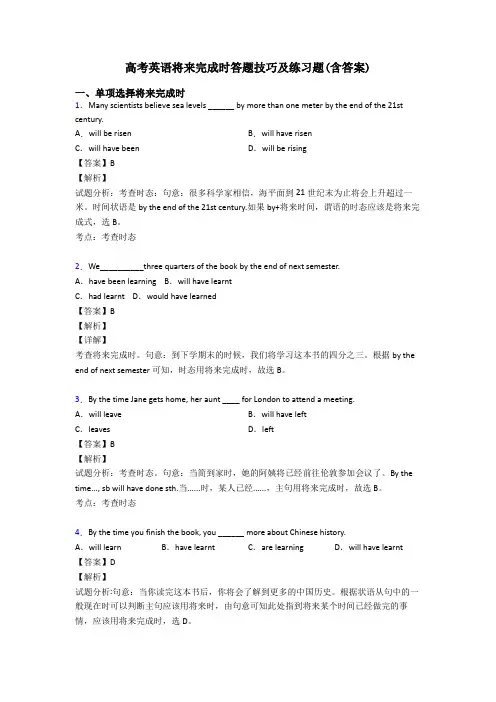
高考英语将来完成时答题技巧及练习题(含答案)一、单项选择将来完成时1.Many scientists believe sea levels ______ by more than one meter by the end of the 21st century.A.will be risen B.will have risenC.will have been D.will be rising【答案】B【解析】试题分析:考查时态:句意:很多科学家相信,海平面到21世纪末为止将会上升超过一米。
时间状语是by the end of the 21st century.如果by+将来时间,谓语的时态应该是将来完成式,选B。
考点:考查时态2.We__________three quarters of the book by the end of next semester.A.have been learning B.will have learntC.had learnt D.would have learned【答案】B【解析】【详解】考查将来完成时。
句意:到下学期末的时候,我们将学习这本书的四分之三。
根据by the end of next semester可知,时态用将来完成时,故选B。
3.By the time Jane gets home, her aunt ____ for London to attend a meeting.A.will leave B.will have leftC.leaves D.left【答案】B【解析】试题分析:考查时态。
句意:当简到家时,她的阿姨将已经前往伦敦参加会议了。
By the time..., sb will have done sth.当......时,某人已经......,主句用将来完成时,故选B。
考点:考查时态4.By the time you finish the book, you ______ more about Chinese history.A.will learn B.have learnt C.are learning D.will have learnt 【答案】D【解析】试题分析:句意:当你读完这本书后,你将会了解到更多的中国历史。
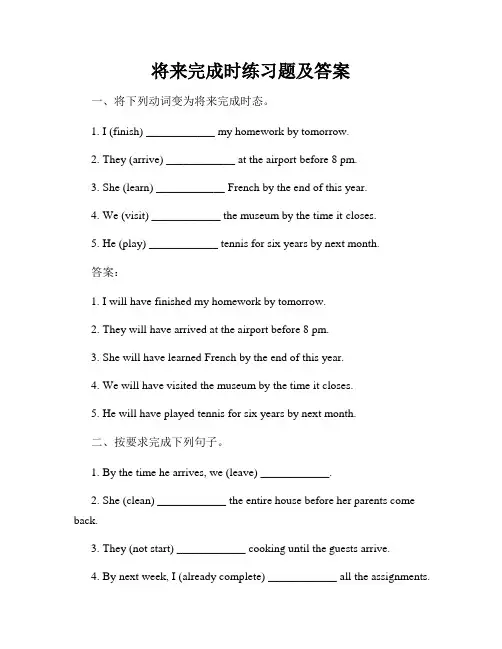
将来完成时练习题及答案一、将下列动词变为将来完成时态。
1. I (finish) ____________ my homework by tomorrow.2. They (arrive) ____________ at the airport before 8 pm.3. She (learn) ____________ French by the end of this year.4. We (visit) ____________ the museum by the time it closes.5. He (play) ____________ tennis for six years by next month.答案:1. I will have finished my homework by tomorrow.2. They will have arrived at the airport before 8 pm.3. She will have learned French by the end of this year.4. We will have visited the museum by the time it closes.5. He will have played tennis for six years by next month.二、按要求完成下列句子。
1. By the time he arrives, we (leave) ____________.2. She (clean) ____________ the entire house before her parents come back.3. They (not start) ____________ cooking until the guests arrive.4. By next week, I (already complete) ____________ all the assignments.5. By the time I finish this book, I (read) ____________ five novels this month.答案:1. By the time he arrives, we will have left.2. She will have cleaned the entire house before her parents come back.3. They will not start cooking until the guests arrive.4. By next week, I will have already completed all the assignments.5. By the time I finish this book, I will have read five novels this month.三、根据上下文填入适当的动词形式。
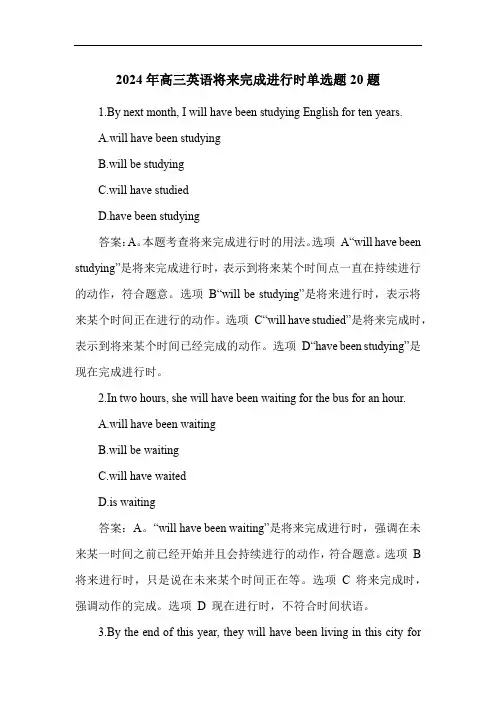
2024年高三英语将来完成进行时单选题20题1.By next month, I will have been studying English for ten years.A.will have been studyingB.will be studyingC.will have studiedD.have been studying答案:A。
本题考查将来完成进行时的用法。
选项A“will have been studying”是将来完成进行时,表示到将来某个时间点一直在持续进行的动作,符合题意。
选项B“will be studying”是将来进行时,表示将来某个时间正在进行的动作。
选项C“will have studied”是将来完成时,表示到将来某个时间已经完成的动作。
选项D“have been studying”是现在完成进行时。
2.In two hours, she will have been waiting for the bus for an hour.A.will have been waitingB.will be waitingC.will have waitedD.is waiting答案:A。
“will have been waiting”是将来完成进行时,强调在未来某一时间之前已经开始并且会持续进行的动作,符合题意。
选项B 将来进行时,只是说在未来某个时间正在等。
选项 C 将来完成时,强调动作的完成。
选项D 现在进行时,不符合时间状语。
3.By the end of this year, they will have been living in this city forfive years.A.will have been livingB.will be livingC.will have livedD.lived答案:A。
将来完成进行时表示到将来某个时间点一直在持续的动作。
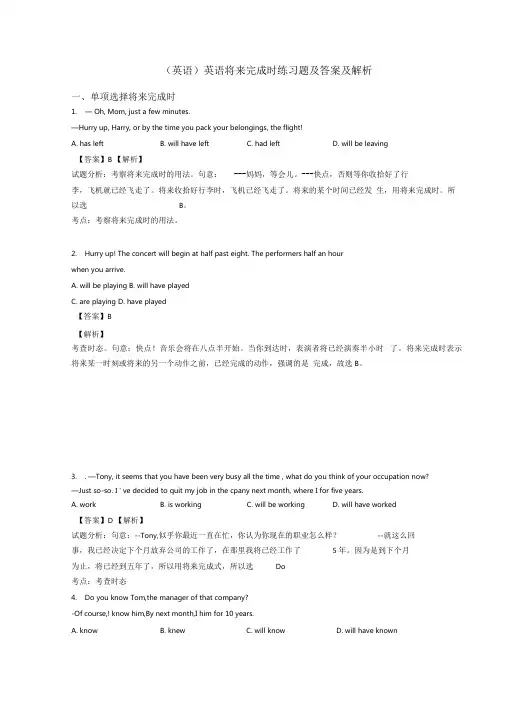
(英语)英语将来完成时练习题及答案及解析一、单项选择将来完成时1.— Oh, Mom, just a few minutes.—Hurry up, Harry, or by the time you pack your belongings, the flight!A. has leftB. will have leftC. had leftD. will be leaving【答案】B 【解析】试题分析:考察将来完成时的用法。
句意:---妈妈,等会儿。
---快点,否则等你收拾好了行李,飞机就已经飞走了。
将来收拾好行李时,飞机已经飞走了。
将来的某个时间已经发生,用将来完成时。
所以选B。
考点:考察将来完成时的用法。
2.Hurry up! The concert will begin at half past eight. The performers half an hourwhen you arrive.A. will be playingB. will have playedC. are playingD. have played【答案】B【解析】考查时态。
句意:快点!音乐会将在八点半开始。
当你到达时,表演者将已经演奏半小时了。
将来完成时表示将来某一时刻或将来的另一个动作之前,已经完成的动作,强调的是完成,故选B。
3.. —Tony, it seems that you have been very busy all the time , what do you think of your occupation now?—Just so-so. I ' ve decided to quit my job in the cpany next month, where I for five years.A. workB. is workingC. will be workingD. will have worked【答案】D 【解析】试题分析:句意:--Tony,似乎你最近一直在忙,你认为你现在的职业怎么样?--就这么回事,我已经决定下个月放弃公司的工作了,在那里我将已经工作了5年。
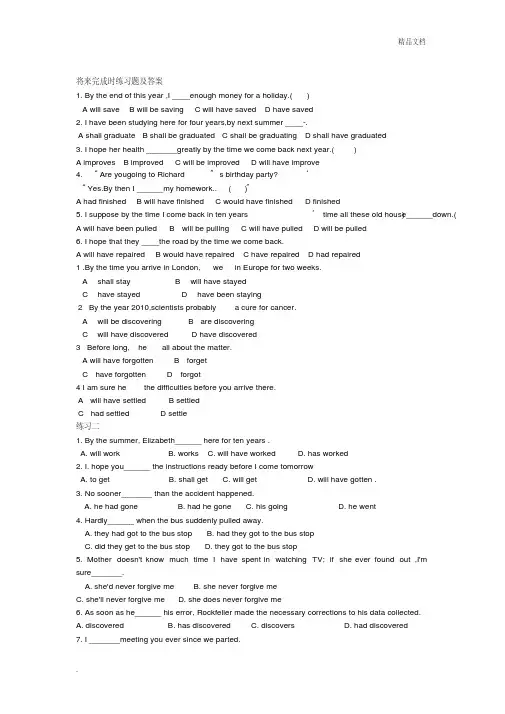
将来完成时练习题及答案1. By the end of this year ,I ____enough money for a holiday.( )A will saveB will be savingC will have savedD have saved2. I have been studying here for four years,by next summer ____-.A shall graduateB shall be graduatedC shall be graduatingD shall have graduated3. I hope her health _______greatly by the time we come back next year.( )A improvesB improvedC will be improvedD will have improve4. “Are yougoing to Richard”s birthday party?‘( )“Yes.By then I ______my homework..”A had finishedB will have finishedC would have finishedD finished)5. I suppose by the time I come back in ten years’ time all these old house______down.(A will have been pulledB will be pullingC will have pulledD will be pulled6. I hope that they ____the road by the time we come back.A will have repairedB would have repairedC have repairedD had repaired1 .By the time you arrive in London, we in Europe for two weeks.A shall stayB will have stayedC have stayedD have been staying2 By the year 2010,scientists probably a cure for cancer.A will be discoveringB are discoveringC will have discoveredD have discovered3 Before long, he all about the matter.A will have forgottenB forgetC have forgottenD forgot4 I am sure he the difficulties before you arrive there.A will have settledB settledC had settledD settle练习二1. By the summer, Elizabeth______ here for ten years .A. will workB. worksC. will have workedD. has worked2. I. hope you______ the instructions ready before I come tomorrowA. to getB. shall getC. will getD. will have gotten .3. No sooner_______ than the accident happened.A. he had goneB. had he goneC. his goingD. he went4. Hardly______ when the bus suddenly pulled away.A. they had got to the bus stopB. had they got to the bus stopC. did they get to the bus stopD. they got to the bus stop5. Mother doesn't know much time I have spent in watching TV; if she ever found out ,I'msure_______.A. she'd never forgive meB. she never forgive meC. she'll never forgive meD. she does never forgive me6. As soon as he______ his error, Rockfeller made the necessary corrections to his data collected.A. discoveredB. has discoveredC. discoversD. had discovered7. I _______meeting you ever since we parted.A. was looking forward toB. have been looking forward toC. had been looking forward toD. looked forward to8.Where have you been? What _____ ?A. did you doB. have you been doingC. have madeD. were you doing9. She has been studying here for five years and by the end of next summer she _____.A. will graduateB. will be graduatingC. will be graduatedD. will have graduated10. When you come tonight at eight o’clock, I _____ eight lessons.A. would reviewB. shall reviewC. shall have reviewedD. shall be reviewing11. “Are Alice and Tom still living in New York?”“No, they _____ to Dallas.”A. are just movedB. have just movedC. had just movedD. will just move12. I haven’t heard from Maria_____.A. since a long timeB. for many months agoC. for many monthsD. since many months before13. His grandfather ______ for thirty years.A. diedB. was deadC. has been deadD. has died14.It’s(high)time you _____ a holiday.A. hadB. haveC. will haveD. have had15. By the time Juan gets home, his aunt _____ for Puerto Rico.A. will leaveB. leavesC. will have leftD. left16.All the machines _____by the end of the following week.A. were repairedB. will be repairedC. have been repaired D will have been repaired17. The conference _____ a full week by the time it ends.A. must have lastedB. will have lastedC. would lastD. has lasted。
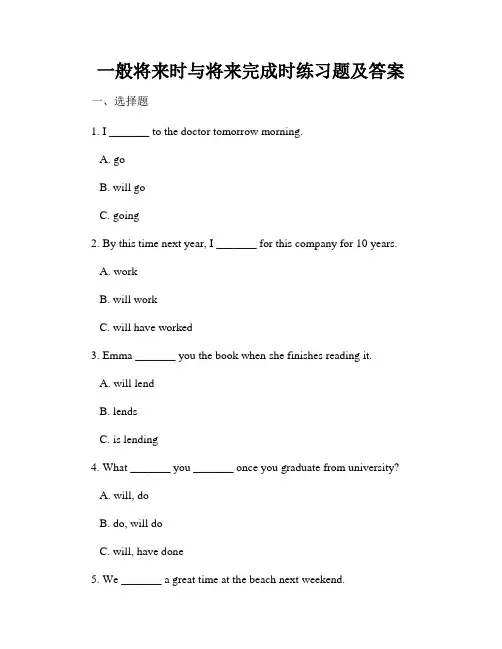
一般将来时与将来完成时练习题及答案一、选择题1. I _______ to the doctor tomorrow morning.A. goB. will goC. going2. By this time next year, I _______ for this company for 10 years.A. workB. will workC. will have worked3. Emma _______ you the book when she finishes reading it.A. will lendB. lendsC. is lending4. What _______ you _______ once you graduate from university?A. will, doB. do, will doC. will, have done5. We _______ a great time at the beach next weekend.A. will haveB. haveC. having二、改错题1. By the time Tom arrives, we will finish the project.2. She's going to meet her friends tonight, and then they will watch a movie.3. I will already have ordered the tickets by the time you get here.4. He will not going to the party unless you come with him.5. By the end of this month, I will worked for this company for five years.三、填空题1. The train _______ (leave) at 8 o'clock tomorrow morning.2. By the time you arrive, I _______ (wait) for over an hour.3. We _______ (not start) the meeting until everyone is present.4. He _______ (probably, not finish) the report by the end of the day.5. Who _______ (you, see) at the concert tomorrow night?四、写作题请根据以下提示用一般将来时和将来完成时写一篇关于未来计划的短文。
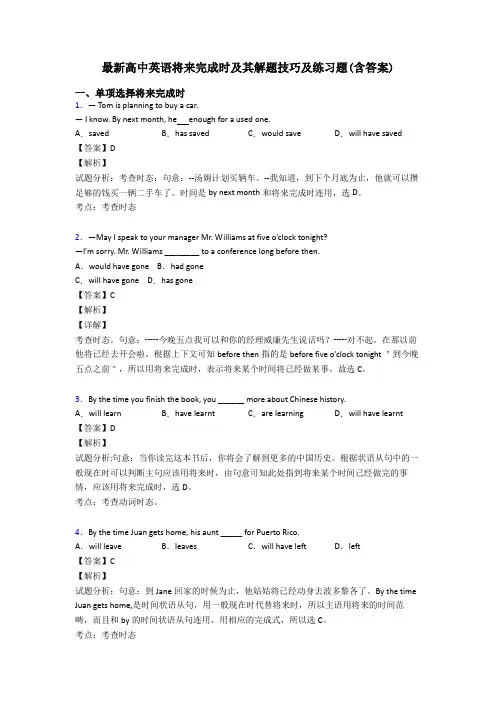
最新高中英语将来完成时及其解题技巧及练习题(含答案)一、单项选择将来完成时1.— Tom is planning to buy a car.— I know. By next month, he enough for a used one.A.saved B.has saved C.would save D.will have saved 【答案】D【解析】试题分析:考查时态:句意:--汤姆计划买辆车。
--我知道,到下个月底为止,他就可以攒足够的钱买一辆二手车了。
时间是by next month和将来完成时连用,选D。
考点:考查时态2.—May I speak to your manager Mr. Williams at five o’clock tonight?—I’m sorry. Mr. Williams ________ to a conference long before then.A.would have gone B.had goneC.will have gone D.has gone【答案】C【解析】【详解】考查时态。
句意:-----今晚五点我可以和你的经理威廉先生说话吗?-----对不起。
在那以前他将已经去开会啦。
根据上下文可知before then指的是before five o’clock tonight "到今晚五点之前",所以用将来完成时,表示将来某个时间将已经做某事。
故选C。
3.By the time you finish the book, you ______ more about Chinese history.A.will learn B.have learnt C.are learning D.will have learnt 【答案】D【解析】试题分析:句意:当你读完这本书后,你将会了解到更多的中国历史。
根据状语从句中的一般现在时可以判断主句应该用将来时,由句意可知此处指到将来某个时间已经做完的事情,应该用将来完成时,选D。
将来完成时与过去将来完成时练习题及答案一、将来完成时练习题1. 请根据括号内的动词提示完成句子。
a) By the time you arrive, we (finish) ________ our work.b) They (see) ________ the movie before it is released.c) I (read) ________ this book by tomorrow.d) By next month, she (complete) ________ her research project.e) They (have) ________ dinner by the time we arrive.2. 选择正确的动词形式完成句子。
a) By the end of this year, I ________ (graduate / will have graduated) from college.b) They ________ (travelled / will have travelled) to Europe before settling down.c) By next week, she ________ (painted / will have painted) the entire house.d) We ________ (finished / will have finished) the project by the time you come back.e) I ________ (cooked / will have cooked) dinner by the time you get home.3. 用所给的动词适当形式填空。
a) By this time next year, they ________ (already / finish) their studies.b) He ________ (write) the report by tomorrow afternoon.c) I ________ (study) English for ten years by the end of this semester.d) By next month, we ________ (save) enough money for the vacation.e) They ________ (move) into their new house by the end of the month.二、过去将来完成时练习题1. 请根据括号内的动词提示完成句子。
高中英语将来完成时解题技巧讲解及练习题( 含答案 ) 含解析一、单项选择将来完成时1.— Tom is planning to buy a car.— I know. By next month, he enough for a used one.A. saved B. has saved C. would save D. will have saved 【答案】 D【解析】试题分析:考查时态:句意:--汤姆计划买辆车。
--我知道,到下个月底为止,他就可以攒足够的钱买一辆二手车了。
时间是by next month 和将来完成时连用,选D。
考点:考查时态2.— May I speak to your manager Mr. Williams at five o’ clock tonight?— I ’ m sorry. Mr. Williams ________ to a conference long before then.A. would have gone B. had goneC. will have gone D. has gone【答案】 C【解析】【详解】考查时态。
句意:-----今晚五点我可以和你的经理威廉先生说话吗?他将已经去开会啦。
根据上下文可知before then 指的是 before five o 五点之前",所以用将来完成时,表示将来某个时间将已经做某事。
故选-----对不起。
在那以前’clock tonight"到今晚C。
3.—Is Tom still smoking?—No. By next Saturday he _____________ for a whole month without smoking a single cigarette.A. will go B. will have gone C. goes D. has been going 【答案】 B【解析】试题分析:考查时态。
将来完成时练习题及答案将来完成时练习题及答案1. By the end of this year ,I ____enough money for a holiday.( )A will saveB will be savingC will have savedD have saved2. I have been studying here for four years,by next summer ____-.A shall graduateB shall be graduatedC shall be graduatingD shall have graduated3. I hope her health _______greatly by the time we come back next year.( )A improvesB improvedC will be improvedD will have improve4. “Are yougoing to Richard”s birthday party?‘“Yes.By then I ______my homework..” ( )A had finishedB will have finishedC would have finishedD finished5. I suppose by the time I come back in ten years’ time all these oldhouse______down.( )A will have been pulledB will be pullingC will have pulledD will be pulled6. I hope that they ____the road by the time we come back.A will have repairedB would have repairedC have repairedD had repaired1 .By the time you arrive in London, we in Europe for two weeks.A shall stayB will have stayedC have stayedD have been staying2 By the year 2010,scientists probably a cure for cancer.A will be discoveringB are discoveringC will have discoveredD have discovered3 Before long, he all about the matter.A will have forgottenB forgetC have forgottenD forgot4 I am sure he the difficulties before you arrive there.A will have settledB settledC had settledD settle练习二1. By the summer, Elizabeth______ here for ten years .A. will workB. worksC. will have workedD. has worked2. I. hope you______ the instructions ready before I come tomorrowA. to getB. shall getC. will getD. will have gotten .3. No sooner_______ than the accident happened.A. he had goneB. had he goneC. his goingD. he went4. Hardly______ when the bus suddenly pulled away.A. they had got to the bus stopB. had they got to the bus stopC. did they get to the bus stopD. they got to the bus stop5. Mother doesn't know much time I have spent in watching TV; if she ever found out ,I'm sure_______.A. she'd never forgive meB. she never forgive meC. she'll never forgive meD. she does never forgive me6. As soon as he______ his error, Rockfeller made the necessary corrections to his data collected.A. discoveredB. has discoveredC. discoversD. had discovered7. I _______meeting you ever since we parted.A. was looking forward toB. have been looking forward toC. had been looking forward toD. looked forward to8. Where have you been? What _____ ?A. did you doB. have you been doingC. have madeD. were you doing9. She has been studying here for five years and by the end of next summer she _____.A. will graduateB. will be graduatingC. will be graduatedD. will have graduated10. When you come tonight at eight o’clock, I _____ eight lessons.A. would reviewB. shall reviewC. shall have reviewedD. shall be reviewing11. “Are Alice and Tom still living in New York?”“No, they _____ to Dallas.”A. are just movedB. have just movedC. had just movedD.will just move12. I haven’t heard from Maria_____.A. since a long timeB. for many months agoC. for many monthsD. since many months before13. His grandfather ______ for thirty years.A. diedB. was deadC. has been deadD. has died14. It’s(high)time you _____ a holiday.A. hadB. haveC. will haveD. have had15. By the time Juan gets home, his aunt _____ for Puerto Rico.A. will leaveB. leavesC. will have leftD. left16. All the machines _____by the end of the following week.A. were repairedB. will be repairedC. have been repaired D will have been repaired17. The conference _____ a full week by the time it ends.A. must have lastedB. will have lastedC. would lastD. has lasted。
将来完成时练习题及答案1. By the end of this year ,I ____enough money for a holiday.( )A will saveB will be savingC will have savedD have saved2. I have been studying here for four years,by next summer ____-.A shall graduateB shall be graduatedC shall be graduatingD shall have graduated3. I hope her health _______greatly by the time we come back next year.( )A improvesB improvedC will be improvedD will have improve4. “Are yougoing to Richard”s birthday party?‘“Yes.By then I ______m y homework..”( )A had finishedB will have finishedC would have finishedD finished5. I suppose by the time I come back in ten years’ time all these old house______down.( )A will have been pulledB will be pullingC will have pulledD will be pulled6. I hope that they ____the road by the time we come back.A will have repairedB would have repairedC have repairedD had repaired1 .By the time you arrive in London, we in Europe for two weeks.A shall stayB will have stayedC have stayedD have been staying2 By the year 2010,scientists probably a cure for cancer.A will be discoveringB are discoveringC will have discoveredD have discovered3 Before long, he all about the matter.A will have forgottenB forgetC have forgottenD forgot4 I am sure he the difficulties before you arrive there.A will have settledB settledC had settledD settle练习二1. By the summer, Elizabeth______ here for ten years .A. will workB. worksC. will have workedD. has worked2. I. hope you______ the instructions ready before I come tomorrowA. to getB. shall getC. will getD. will have gotten .3. No sooner_______ than the accident happened.A. he had goneB. had he goneC. his goingD. he went4. Hardly______ when the bus suddenly pulled away.A. they had got to the bus stopB. had they got to the bus stopC. did they get to the bus stopD. they got to the bus stop5. Mother doesn't know much time I have spent in watching TV; if she ever found out ,I'm sure_______.A. she'd never forgive meB. she never forgive meC. she'll never forgive meD. she does never forgive me6. As soon as he______ his error, Rockfeller made the necessary corrections to his data collected.A. discoveredB. has discoveredC. discoversD. had discovered7. I _______meeting you ever since we parted.A. was looking forward toB. have been looking forward toC. had been looking forward toD. looked forward to8.Where have you been? What _____ ?A. did you doB. have you been doingC. have madeD. were you doing9. She has been studying here for five years and by the end of next summer she _____.A. will graduateB. will be graduatingC. will be graduatedD. will have graduated10. When you come tonight at eight o’clock, I _____ eight lessons.A. would reviewB. shall reviewC. shall have reviewedD. shall be reviewing11. “Are Alice and Tom still living in New York?”“No, they _____ to Dallas.”A. are just movedB. have just movedC. had just movedD. will just move12. I haven’t heard from Maria_____.A. since a long timeB. for many months agoC. for many monthsD. since many months before13. His grandfather ______ for thirty years.A. diedB. was deadC. has been deadD. has died14.It’s(high)time you _____ a holiday.A. hadB. haveC. will haveD. have had15. By the time Juan gets home, his aunt _____ for Puerto Rico.A. will leaveB. leavesC. will have leftD. left16.All the machines _____by the end of the following week.A. were repairedB. will be repairedC. have been repaired D will have been repaired17. The conference _____ a full week by the time it ends.A. must have lastedB. will have lastedC. would lastD. has lasted。
初二英语将来完成时特殊用法练习题20题含答案解析1.By next month, I ______ my project.A.will finishB.will have finishedC.have finishedD.finished答案解析:B。
本题考查将来完成时。
By next month 表示在将来某一时间之前,所以要用将来完成时will have finished。
A 选项will finish 是一般将来时;C 选项have finished 是现在完成时;D 选项finished 是一般过去时。
2.Tomorrow evening, she ______ all her homework.A.will finishB.will have finishedC.finishesD.finished答案解析:B。
Tomorrow evening 表示将来的时间,且题干强调在这个时间点之前已经完成的动作,所以用将来完成时will have finished。
A 选项will finish 只是一般将来时;C 选项finishes 是一般现在时;D 选项finished 是一般过去时。
3.By the end of this week, we ______ the book.A.will readB.will have readC.readD.have read答案解析:B。
By the end of this week 表示在将来某一时间之前,要用将来完成时will have read。
A 选项will read 是一般将来时;C 选项read 是一般现在时或一般过去时;D 选项have read 是现在完成时。
4.Next Sunday, they ______ the museum.A.will visitB.will have visitedC.visitD.visited答案解析:B。
将来完成时练习题及答案1. By the end of this year ,I ____enough money for a holiday.( C )A will saveB will be savingC will have savedD have saved2. I have been studying here for four years,by next summer _D___-.A shall graduateB shall be graduatedC shall be graduatingD shall have graduated3. I hope her health _______greatly by the time we come back next year.( D )A improvesB improvedC will be improvedD will have improve4. “Are yougoing to Richard”s birthday party?‘“Yes.By then I ______my homework..”( C )A had finishedB will have finishedC would have finishedD finished5. I suppose by the time I come back in ten years’ time all these old house______down.( A)A will have been pulledB will be pullingC will have pulledD will be pulled6. I hope that they _A_____the road by the time we come back.A will have repairedB would have repairedC have repairedD had repaired1.选C,by the end of this year, 是明确表示将来的时间状语,主句表示在这个将来时间以前完成的动作,故应用将来完成时.2.选D.by next summer是明确表示将来的时间状语, 主句表示在这个将来时间以前完成的动作,故应用将来完成时.3.选D,by the time 引出的是时间状语分句,分句中用的come用一般现在时,表示将来概念,相当于一个表示将来的时间状语,主句谓语动词表示在将来某一时刻以前必定完成的行为,应该用将来完成时.不能选A,句子中带有表示将来时间的状语分句,故应该用与将来时相关的时态.也不能选C ,improve 在该句中作”好转”,”变得更好”解,为不及物动词,所以用被动语态时错误的.4.B5.A6.A.By the time you arrive in London, we B in Europe for two weeks.A shall stayB will have stayedC have stayedD have been staying答案B2 By the year 2010,scientists probably C a cure for cancer.A will be discoveringB are discoveringC will have discoveredD have discovered答案CBy the year 2010 是明确表示将来的时间状语,主句表示在这个时间以前完成的动作,故用将来完成时.3 Before long, he A all about the matter.A will have forgottenB forgetC have forgottenD forgot答案A4 I am sure he A the difficulties before you arrive there.A will have settledB settledC had settledD settle答案A before you arrive there. 是明确表示将来的时间状语,主句表示在这个时间以前完成的动作,故用将来完成时.练习二1. By the summer, Elizabeth______ here for ten years .A. will workB. worksC. will have workedD. has worked2. I. hope you______ the instructions ready before I come tomorrowA. to getB. shall getC. will getD. will have gotten .3. No sooner_______ than the accident happened.A. he had goneB. had he goneC. his goingD. he went4. Hardly______ when the bus suddenly pulled away.A. they had got to the bus stopB. had they got to the bus stopC. did they get to the bus stopD. they got to the bus stop5. Mother doesn't know much time I have spent in watching TV; if she ever found out ,I'm sure_______.A. she'd never forgive meB. she never forgive meC. she'll never forgive meD. she does never forgive me6. As soon as he______ his error, Rockfeller made the necessary corrections to his data collected.A. discoveredB. has discoveredC. discoversD. had discovered7. I _______meeting you ever since we parted.A. was looking forward toB. have been looking forward toC. had been looking forward toD. looked forward to8.Where have you been? What _____ ?A. did you doB. have you been doingC. have madeD. were you doing9. She has been studying here for five years and by the end of next summer she _____.A. will graduateB. will be graduatingC. will be graduatedD. will have graduated10. When you come tonight at eight o’clock, I _____ eight lessons.A. would reviewB. shall reviewC. shall have reviewedD. shall be reviewing11. “Are Alice and Tom still living in New York?”“No, they _____ to Dallas.”A. are just movedB. have just movedC. had just movedD. will just move12. I haven’t heard from Maria_____.A. since a long timeB. for many months agoC. for many monthsD. since many months before13. His grandfather ______ for thirty years.A. diedB. was deadC. has been deadD. has died14.It’s(high)time you _____ a holiday.A. hadB. haveC. will haveD. have had15. By the time Juan gets home, his aunt _____ for Puerto Rico.A. will leaveB. leavesC. will have leftD. left16.All the machines _____by the end of the following week.A. were repairedB. will be repairedC. have been repaired D will have been repaired17. The conference _____ a full week by the time it ends.A. must have lastedB. will have lastedC. would lastD. has lasted语法练习1 答案1 .C 将来完成时态。
By 指:到什么时间为止。
2 .D 将来完成时态。
tomorrow 表示将来,get the instructions (指令,指示)这个动作在我回来之前已经完成。
3 .B “no sooner……than……”( 刚……就……) ,在no sooner 这部分应当用过去完成时,than 后面用一般过去时。
A ,B 都是过去完成时态,怎么选择?No sooner 的特殊用法,在其后面跟倒装语序,所以选B 。
4 .Bhardly……when……( 一……就……) ,hardly 后应当用过去完成时,when 后面用一般过去时。
hardly 的特殊用法,在其后面跟倒装语序,所以选B 。
5 .A 过去将来时态。
Forgive 原谅,She’d 相当于:she would. 妈妈不知道我看电视花费了多长时间,如果她知道的话,我相信她将永远不会原谅我。